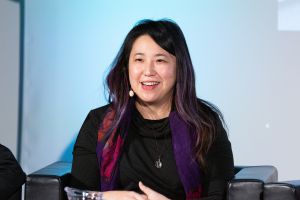Ich möchte auf zwei Formulierungen zurückkommen, die Sie in die Podiumsdiskussion eingebracht haben: Zum einen auf das Zitat „What are you prepared to give up?“ Von wem stammt es? Zum anderen sprachen Sie in Zusammenhang mit dem Kolonialismus des britischen Empires über die Notwendigkeit von „undoing the script“: Wie definieren Sie diesen Begriff?

Shzr EeTan (SET): Das Zitat stammt von Chi-chi Nwanoku, einer britischen Musikerin nigerianischer und irischer Herkunft, die sehr engagiert die Inklusion von Black and Minority Ethnics (BME) in den klassischen Musikbetrieb vorantreibt. Sie wollte eine Reflexion über die privilegierten Positionen von Musiker_innen anregen und hat in Großbritannien eine breite Diskussion über Privilegienabbau angestoßen. Nwanoku gründete 2015 das Chineke! Orchestra, das erste professionelle Orchester in Europa, das sich mehrheitlich aus BME-Musiker_innen zusammensetzt.
Mit dem Begriff Skript beziehe ich mich u.a. auf Richard Schechner und Erving Goffman, weiße Theoretiker der Soziologie und Intercultural Theory. Ich glaube, dass wir in unserem täglichen Leben, und nicht nur auf der Bühne, in unseren Gesprächen nach bestimmten Skripts bzw. Regeln auftreten. Ich spreche zum Beispiel mit Ihnen oder meinem Vorgesetzten anders als mit meiner Mutter, weil meine jeweiligen Beziehungen zu allen dreien aufgrund der Umstände und Hierarchien, in denen wir uns befinden, unterschiedlich sind. Meine Wortwahl, mein Tonfall und sogar meine Körpersprache ändern sich. Manchmal sind die Unterschiede auf unterschiedliche Intimität und relationale Professionalität zurückzuführen, aber oft folgen wir einem soziokulturellen Skript, das durch die fortgesetzten und ungleichen Machtstrukturen der Gesellschaft vorgegeben ist, in der manche Menschen unbewusst „den Schwächeren spielen“ müssen, um überhaupt ein Gespräch führen zu können, bloß weil es einfacher ist. Sich gegen ein solches Skript zu wehren, erfordert sowohl viel Anstrengung als auch viel Mut.
Wie können nun Individuen ermächtigt werden, dem Skript nicht zu folgen oder es zu ändern? Welche Spielräume für die inklusive und geschlechtergerechte Ausgestaltung von Lehre, Wissenschaft und Forschung an Kunstuniversitäten sind dafür nötig, Stichwort „safe spaces“?
SET: Ich arbeite als Leiterin der Stelle für Gleichbehandlung, Diversität und Inklusion an der School of Performing and Digital Arts des Royal Holloway, wo die Community der Studierenden sehr international ist. Internationale Studierende zahlen höhere Studiengebühren als die lokalen Studierenden. Oft erfahren diese Studierenden erstmals in England Diskriminierung in Form von Mikroaggressionen wie zum Beispiel Augenrollen oder Bemerkungen über den Akzent, die aber nie offen angesprochen werden. In ihren Herkunftsländern waren diese Studierenden Teil einer Mehrheit, die meisten davon allerdings aus besser gestellten Klassen. Unter internationalen Studierenden gibt es leider häufig eine Klassenhomogenität. Um zu den Mikroaggressionen zurückzukehren: Sie verwandeln sich durch Wiederholung in strukturelle Unterdrückung, die wirklich schlimme psychische Konflikte bei den Betroffenen auslösen kann. Es ist, als ob man jeden Tag eine zusätzliche Last von 10 kg mit sich herumschleppt, ständig den Leuten erklären muss, woher man wirklich kommt, oder dass man der englischen Sprache mächtig ist, bevor man als Forscherin ernst genommen wird. Das ist unbezahlte, emotionale Arbeit. Deshalb sollte man nicht einfach sagen, dass Diskriminierung bedeutet, jemandes Gefühle seien verletzt worden, sondern diese Verletzungen gehen viel tiefer und sind strukturell bedingt.
Zur Notwendigkeit von „safe spaces“ möchte ich sagen, dass wir zum Beispiel im Rahmen des Forschungsprojektes mit Maiko Kawabata einen Study Day zum Thema Cultural Imperialism and the New ,Yellow Peril‘ in Western Classical Music im Juni 2019 organisiert haben. Dort luden wir im offenen Forum die Teilnehmer_innen dazu ein, kleine Breakout-Gruppen zu bilden. Das waren „safe spaces“, die funktioniert haben, in denen alle sehr frei und offen gesprochen haben. Noch wichtiger ist, dass wir – und ich schließe hier Verbündete ein – auch in diesen Räumen Fehler machen und Fragen stellen konnten, ohne beurteilt zu werden.
Haben Sie Vorschläge, wie man universitäre Gremien, wie zum Beispiel Berufungskommissionen, inklusiver gestalten könnte?
SET: Ich denke, dass unsere Gremien am Department for Music am Royal Holloway bis jetzt nicht über eine offizielle Strategie verfügen, die tatsächlich die Besetzung der Gremien zwingend inklusiver bzw. diverser macht – aufgrund der geringen Größe des Departments können wir uns allerdings jedes Mal aufs Neue aktiv darum bemühen. Verpflichtend ist jedoch für alle bei Stellenantritt ein Unconscious-Bias-Training, eine verpflichtende Weiterbildung über unbewusste Vorurteile, die sich in diskriminierendem Verhalten äußern. Neben der begrüßenswerten Vision, dass nicht nur die Studierenden, sondern auch das Universitätspersonal diverser werden sollte, möchte ich aber auch auf die Gefahr der Identitätspolitik hinweisen, wie sie mittlerweile in den USA praktiziert wird: Einzelne marginalisierte Gruppen werden in einer ungesunden Opfer-Täter-Dynamik gegeneinander ausgespielt, anstatt Pluralität auf allen gesellschaftlichen Ebenen zu stärken.
Übersetzung aus dem Englischen von Karoline Feyertag.

